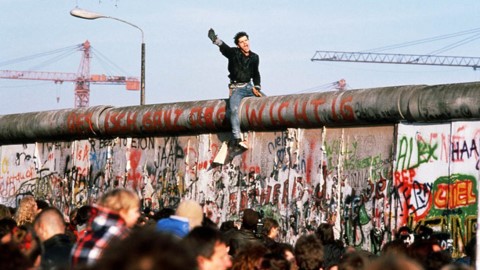Top 10 Moments That Made The World Stand Still

- Space Shuttle Challenger Disaster
- Munich Massacre
- Tiananmen Square Protests
- Tohoku Earthquake and Tsunami
- The Assassination/Funeral of John F. Kennedy
- The Fall of the Berlin Wall
- Indian Ocean Earthquake and Tsunami
- September 11 Attacks
- Apollo 11 Moon Landing
- Atomic Bombings of Hiroshima and Nagasaki
#10: Space Shuttle Challenger Disaster
1986
With teacher Christa McAuliffe on board and hundreds of schoolchildren watching in real-time, the Challenger launch was to be the first of its kind. Though CNN transmitted the sole live broadcast, news of the disaster spread like wildfire through other networks. Because the media focused on the story’s ‘human element’ and tragic moments for dramatic effect, it became a hot topic for several weeks and it changed future news reporting.
#9: Munich Massacre
1972
Since the initial attack on the Israeli athletes at the 1972 Summer Olympics by Black September took place in the wee hours of the morning, the cameras weren’t yet rolling. But once morning came along, the media covered the response so well that the Palestinian terrorists already knew when and how the German-border police were preparing to attack them! Unfortunately, the Munich Massacre resulted in the deaths of the hostages and several others.
#8: Tiananmen Square Protests
1989
As the Beijing student protests turned into the Tiananmen Square Massacre, the western world witnessed social unrest in a foreign and unreachable location for the first time via their TVs. Though most networks were barred from broadcasting the violent military crackdown, their real-time reporting went on to boost live television coverage of international events. It also influenced Western policymakers to implement economic sanctions and arms restrictions on China.
#7: Tohoku Earthquake and Tsunami
2011
After the most powerful earthquake the country had ever seen struck an area near Tohoku, a potent tsunami washed over Japan and killed thousands. Japanese TV networks and CNN were there to capture this horrifying act of nature. Though the continuous footage of the destruction caused by the deadly waters shocked the world, the coverage also encouraged a massive worldwide relief response.
#6: The Assassination/Funeral of John F. Kennedy
1963
The assassination of the 35th President of the United States ushered in the age of TV news by giving people instant access to unfolding developments through moving pictures. Two days after JFK’s death, NBC aired continuous footage of the overnight public viewing. His funeral was then watched by approximately 180 million on television the next day. Millions later witnessed the shooting of sniper Lee Harvey Oswald in a real-time broadcast, as well.
#5: The Fall of the Berlin Wall
1989
It took almost 30 years for the barrier dividing West Berlin from East Berlin to finally be torn down: following protests and growing crowds of East German refugees making their way to the west, the authorities were forced to open the gates. For the next few weeks, TV audiences worldwide watched as the Germans came together to demolish the wall, and Communism in Germany as well.
#4: Indian Ocean Earthquake and Tsunami
2004
Resulting in over 230,000 casualties, the Sumatra-Andaman earthquake is one of history’s most fatal natural disasters. The megathrust tremor generated multiple tsunamis off Indonesia’s western coast and affected 14 countries with the ensuing floods. While widespread media coverage of these images shocked the world, it also triggered a massive global response in terms of donations and relief efforts.
#3: September 11 Attacks
2001
Everyone remembers where they were, what they were doing and what they felt when they heard news of the shocking al-Qaeda terrorist attacks. Moments after the World Trade Center was hit, media outlets quickly picked up live feeds that glued worldwide audiences to their TV sets. So when another plane crashed into the South Tower less than twenty minutes later, it was truly a moment no one will ever forget. Coverage of the tragedy and its aftermath changed the way western news was reported globally and became the lengthiest continuous news event to be covered in American television.
#2: Apollo 11 Moon Landing
1969
This “giant leap for mankind” was also a giant leap for the United States: the live television broadcast of astronaut Neil Armstrong’s “small step for man” placed America at the head of the space race. Though he set foot at 10:56pm Eastern Daylight Time, over 500 million people around the world experienced history-in-the-making. Thanks to the magic of television, the recorded footage took less than 1.5 seconds to reach Earth.
Before we unveil our number one pick, here are a few honorable mentions:
- Iran Hostage Crisis
1979 - 81
- Mumbai Attacks
2008
- Hindenburg Disaster
1937
- O.J. Simpson Murder Trial Verdict
1995
- Invasion of Iraq
2003
#1: Atomic Bombings of Hiroshima and Nagasaki
1945
The atomic bombings of these two Japanese cities during World War II remains the only time nuclear weapons were dropped during a global war. Thanks to footage captured by the U.S. War Department, few will ever forget the mushroom clouds that developed after the Little Boy and Fat Man bombs exploded over Hiroshima and Nagasaki. The result was over 240, 000 deaths, with newsreels capturing the aftermath. Things would never be the same.
Do you agree with our list? What global moment made your world stand still? If you didn't see something you thought should be on here, be sure to check out our lists of the Top 10 Craziest Events Caught on Live TV, Another Top 10 Craziest Events Caught on Camera and the Top 10 Televised Events. With informative top 10s published daily, be sure to subscribe to WatchMojo.com.


 1
1
 0
0
 report
report